The Ministry of National Defense yesterday announced draft reforms to the military pension system, which would phase out the 18 percent preferential savings rate within the first year and slash pensions.
The 18 percent savings rate for current personnel and veterans who opted for monthly pension payments would be phased out within the first year, while the original funds would be returned to the pensioner, the ministry said.
The monthly pension program would be recalculated based on the new program, with those receiving higher monthly pay seeing their pensions cut over 10 years until it reaches the new amount, it said.
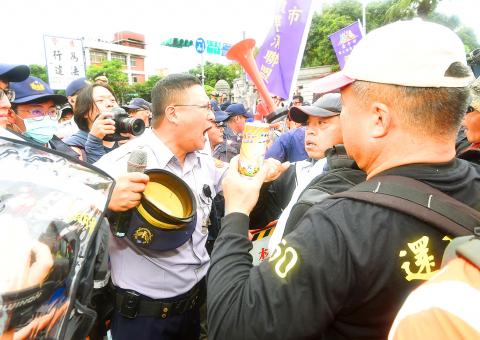
Photo: Fang Pin-chao, Taipei Times
Veterans who received a lump-sum payment — provided that the amount along with payouts from military insurance do not exceed the minimum of NT$32,160 (US$1,066) — would retain the 18 percent preferential savings rate for their principal capital, the ministry said.
For those with a lump-sum payment that exceeds the minimum stipulated by the new program, preferential savings would drop to 12 percent between July 1 next year and Dec. 31, 2020, after which it would decrease by 2 percentage points every two years until January 2025, it said.
Veterans forced into early retirement by previous programs would be given a pension proportionate to their years served, with the difference between their pension and the new mandated minimum subsidized by the government, the ministry said.
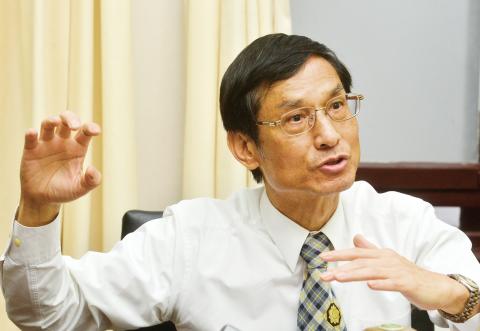
Photo: Wang Yi-sung, Taipei Times
Spouses of deceased veterans would still be entitled to half of their spouse’s monthly pension without an age limit, provided that the spouse remains unmarried and was married to the veteran for more than two years, it said.
Spouses who are wedded to retirees must be 55 years old and have been wedded to the pensioner for 10 years to be eligible to receive half their spouse’s monthly pension upon their death, the ministry said.
The maximum retirement age for senior and junior officers is to be extended by two years, while the age for major generals would be capped at 57 years old, lieutenant generals at 60 and three-star and four-star generals at 64 and 70 respectively, it said.
Time spent on special operations or missions would be included in years of service under the plan.
The draft reforms would increase payout rates to 18 percent while maintaining the current sharing ratio, in which the government absorbs 65 percent of the payout, the ministry said.
Pension calculations would be based on the average monthly payments during a veteran’s last 36 months of service and would guarantee a minimum of NT$32,160, it said, while pensions before the amendment is promulgated would still be calculated by doubling a veteran’s salary at the time of their retirement.
The ministry and the Veterans’ Affairs Council are to hold public hearings for current and retired military personnel to share their opinions, the ministry said, adding that it would forward the opinions to the Executive Yuan.
The phasing out of the 18 percent rate would cut payouts, but also offer an additional NT$193 billion for the pension foundation to ensure its smooth operations for at least 30 years, the ministry said.
At least NT$100 billion would come from the council, which is to budget NT$10 billion every year for the next 10 years to the foundation, it added.
The ministry is to increase the foundation’s transparency and work to minimize political intervention on its operations, the ministry said, adding that it would hold a quinquennial inspection of the foundation after the reforms are enacted.

One of two tropical depressions that formed off Taiwan yesterday morning could turn into a moderate typhoon by the weekend, the Central Weather Administration (CWA) said yesterday. Tropical Depression No. 21 formed at 8am about 1,850km off the southeast coast, CWA forecaster Lee Meng-hsuan (李孟軒) said. The weather system is expected to move northwest as it builds momentum, possibly intensifying this weekend into a typhoon, which would be called Mitag, Lee said. The radius of the storm is expected to reach almost 200km, she said. It is forecast to approach the southeast of Taiwan on Monday next week and pass through the Bashi Channel
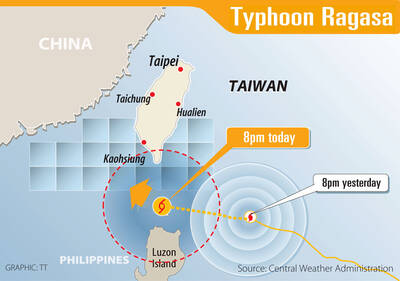
WARNING: People in coastal areas need to beware of heavy swells and strong winds, and those in mountainous areas should brace for heavy rain, the CWA said The Central Weather Administration (CWA) yesterday issued sea and land warnings for Typhoon Ragasa, forecasting that it would continue to intensify and affect the nation the most today and tomorrow. People in Hualien and Taitung counties, and mountainous areas in Yilan and Pingtung counties, should brace for damage caused by extremely heavy rain brought by the typhoon’s outer rim, as it was upgraded to a super typhoon yesterday morning, the CWA said. As of 5:30pm yesterday, the storm’s center was about 630km southeast of Oluanpi (鵝鑾鼻), Taiwan’s southernmost tip, moving northwest at 21kph, and its maximum wind speed had reached
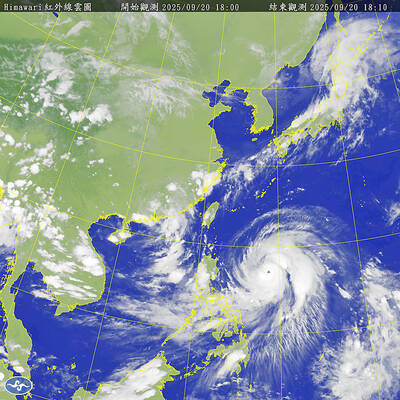
The Central Weather Administration (CWA) yesterday said that it expected to issue a sea warning for Typhoon Ragasa this morning and a land warning at night as it approached Taiwan. Ragasa intensified from a tropical storm into a typhoon at 8am yesterday, the CWA said, adding that at 2pm, it was about 1,110km east-southeast of Oluanpi (鵝鑾鼻), Taiwan’s southernmost tip. The typhoon was moving northwest at 13kph, with sustained winds of up to 119kph and gusts reaching 155kph, the CWA Web site showed. Forecaster Liu Pei-teng (劉沛滕) said that Ragasa was projected to strengthen as it neared the Bashi Channel, with its 200km
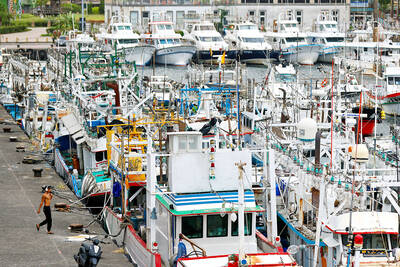
PUBLIC ANNOUNCEMENTS: Hualien and Taitung counties declared today a typhoon day, while schools and offices in parts of Kaohsiung and Pingtung counties are also to close Typhoon Ragasa was forecast to hit its peak strength and come closest to Taiwan from yesterday afternoon through today, the Central Weather Administration (CWA) said. Taiwan proper could be out of the typhoon’s radius by midday and the sea warning might be lifted tonight, it added. CWA senior weather specialist Wu Wan-hua (伍婉華) said that Ragasa’s radius had reached the Hengchun Peninsula by 11am yesterday and was expected to hit Taitung County and Kaohsiung by yesterday evening. Ragasa was forecast to move to Taiwan’s southern offshore areas last night and to its southwestern offshore areas early today, she added. As of 8pm last night,